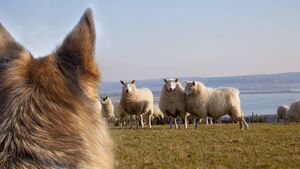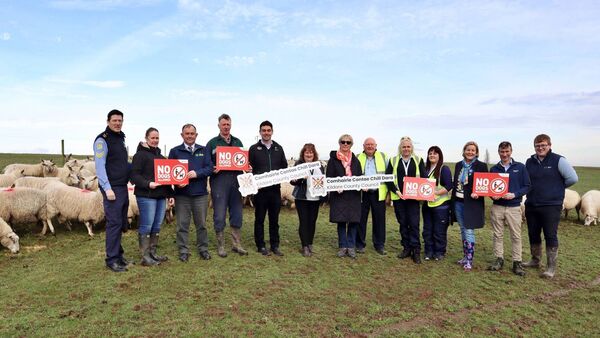Up to 60 sheep flocks hunted by dogs in Kildare

Photo for illustrative purposes only
A CALL for a more coherent system of dealing with sheep worrying has been made by IFA members in Kildare and West Wicklow. At a time of year when the problem traditionally has its worst consequences, sheep farmers say that proper enforcement of dog licensing would be a key part of a more effective system.
Up to 60 flocks are subjected to ‘hunts’ by groups of dogs in the Kildare area each year, according to Denis Halpin, chairman of Kildare West Wicklow IFA. But that might not be an accurate figure, as not all such incidents are reported.
Henry O’Connor of Ardclough IFA, whose flock has experienced serious instances of dog worrying through years, says most culprits are ordinary dogs, possibly in many cases let out in the morning when their owners go to work.
“Or they can be let out at night when their owners come home, and then it’s worse because nobody can see what’s going on.” Because dogs like to hunt in packs, one left out will find a couple more, “and then there’s huge damage done”.
When sheep are savaged, the gory results will often make headlines, but the damage done just by being chased is equally harrowing, if not more so.
“All it takes at this time of the year is a worry and the ewes can lose their lambs,” Henry O’Connor says.
“If the lamb dies inside the ewe, that causes huge problems. And even if the lamb is successfully born, between the trauma of the birth and the effects of the hunt before they are born, they can die after as little as ten or 15 minutes because their hearts aren’t able to take the stress.”

He adds that ‘hunting’ a flock will stress sheep so much that it can take them up to two months to recover. “They’re not just alright again the next day.”
A recent IFA-sponsored event was organised at Henry O’Connor’s farm to highlight the need for a tighter and more structured system between the farmers, council and An Garda Síochána that incidents can be reported and dealt with.
Key to that, Henry O’Connor believes, is an integration of the legal but separate requirements of chipping and licensing dogs, so that – just like a garda can now scan a car number plate and immediately find if the car is insured or the owner has a licence – a check by a vet on a microchip should be able to show if the animal’s owner has a current licence for it.
Denis Halpin believes that thousands of dog owners don’t buy licences for their animals, and that a properly developed system would be self-funding for putting such enforcement capability in place. “The council wouldn’t have to be funding dog wardens; the extra income from the scheme would actually allow for many more wardens to be employed directly.”
He says it would also provide a funding stream to provide more kennel space for stray or seized dogs, which is necessary because existing kennels are generally full. “Particularly so at the moment because of the new XL Bully regulations.”
Kildare County Council currently funds two dog wardens for the whole county, although money has been put aside for the employment of two more. But there are limits on a dog warden’s powers: a dog owner can be prosecuted for not having a licence, but that prosecution has to be taken by a garda, supported by the warden as a witness. Any subsequent fine has to be collected by the sheriff if it is not paid voluntarily.
“That means most fines for dog licences just don’t get paid,” says Denis Halpin.
Also, a warden can’t simply take a dog from its owner: seizure or destruction orders have to be issued by a court before the dog can be taken. “In many cases, those dogs will have been moved on in the interim, to a relative maybe,” he adds.
In the general matter of straying dogs, Kildare dog warden Seamus Deay believes there’s been an improvement over recent years. He puts that as largely down to education, including through visits by dog wardens to community groups and schools.
“Since I started in 1993, there are absolutely fewer stray dogs than there used to be. It’s all about getting the message out,” he says.





